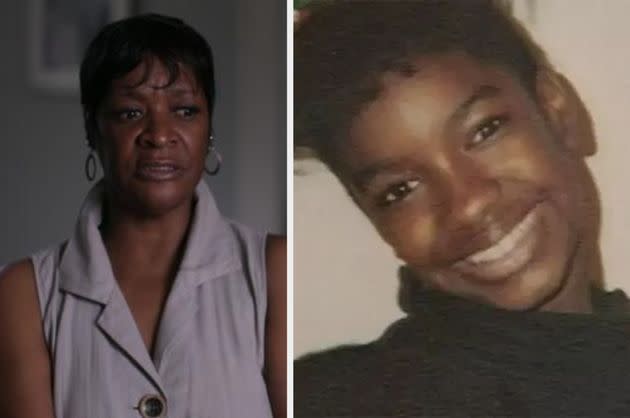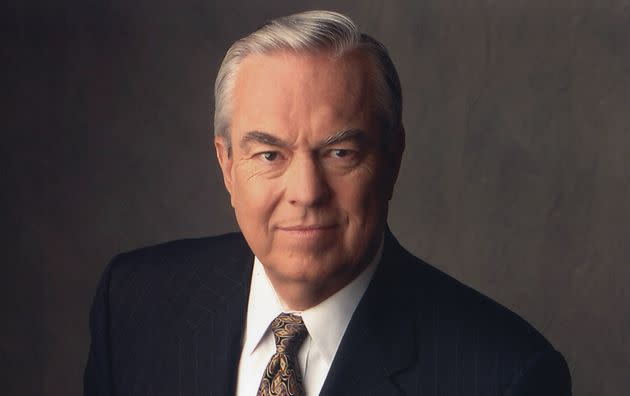‘Cold Case Files’ Host Bill Kurtis Shares The True Crime Cases That Keep Him Up At Night
- Oops!Something went wrong.Please try again later.
- Oops!Something went wrong.Please try again later.
This is an excerpt from our true crime newsletter, Suspicious Circumstances, which sends the biggest unsolved mysteries, white collar scandals, and captivating cases straight to your inbox every week. Sign up here.
You may not recognize Bill Kurtis’ name or face, but if you watch true crime shows, you definitely know his iconic voice. The veteran Chicago TV journalist has been the host, narrator and producer for some of the most popular and longest-running true crime docuseries: A&E’s “Investigative Reports,” “American Justice” and “Cold Case Files,” which was nominated for two primetime Emmy Awards in 2004 and 2005.
“Cold Case Files” has been revived both on A&E and Netflix, and now Kurtis is back again, this time on Hulu, with “Cold Case Files: DNA Speaks.” Each episode of the 10-part docuseries features a decadesold case that was solved using DNA evidence — some of it collected long before investigators had the technology to analyze it and identify a suspect.
Kurtis, whom you might also recognize as the narrator of the “Anchorman” films and the announcer for NPR’s “Wait Wait… Don’t Tell Me!,” told HuffPost last week about some of the most memorable crimes he’s covered — some that still keep him awake at night — and whether he thinks a life sentence is harsh enough punishment for some killers.
He noted that most cold cases that are solved share a common denominator: loved ones’ never-ending pursuit of justice for the victims, and investigators’ dedication to finding closure for those families.
“In these cases, there’s always someone waiting for it to be solved,” Kurtis told HuffPost. “I call these the ‘grandmother solutions’” — family members who regularly check in with police, contact news outlets and hold public memorials to make sure the murder victims aren’t forgotten.”

Acquanellia Smith appears in an episode of 'Cold Case Files: DNA Speaks'; Nacole Smith is shown in an undated photo.
The first episode of the new “Cold Case Files” is about the 1995 murder of a 14-year-old Atlanta girl, Nacole Smith, who took a shortcut through a wooded path after she realized she’d forgotten her homework on the way to school. She was sexually assaulted and shot twice in the face.
In the years following Nacole’s murder, investigators identified several potential suspects, but their DNA didn’t match her attacker’s profile. Nearly 20 years later, investigators linked DNA from the sexual assault of a 13-year-old girl in 2004 to Nacole’s case. Genetic genealogy narrowed down a suspect, whose DNA was obtained from a cigarette detectives picked up after detectives surveilling him saw him smoking.
“There are two sides to this story,” Kurtis said. “One is the mother [Acquanellia Smith], who is distraught and looking for justice for 20 years. The other are the detectives. And the detectives will very likely — it’s so long, 20, 30, 40 years — they will turn over. But this one detective was haunted for 20 years.”
The suspect in this case, Kelvin Arnold, died from liver and kidney failure before he could be prosecuted.
When asked how he feels when a suspect is identified after they die, Kurtis said, “Well, I’m thrilled. You know the detectives are not, the family is not. They want to be able to face him, talk to him, find out why. ‘Why would you do this?’ For me? I’m glad that the dark hand of justice, you know, came down. That’s ultimately the justice.”
Kurtis has been a fierce opponent of the death penalty, arguing in his 2004 book “The Death Penalty on Trial” that it should be abolished because so many innocent people had been wrongly convicted and condemned to death.
“But it was 20 years ago, and I have to admit I’m making some exceptions,” Kurtis said, when he thinks about particularly horrendous killings.
“Oh, my God,” he said. “Every time you think, ‘OK, well, life in prison without parole is OK,’ [there’s a] new terrible one.” Several weeks ago, authorities charged a Chicago man with deliberately shooting and killing a 9-year-old girl. Witnesses said he had complained about the noise she and other children made while playing in their neighborhood.
“Now, you have to wonder what kind of a human being or monster would do that,” Kurtis said. “Well, you say mentally ill. Well, is a serial killer mentally ill? They’re obviously wired in a different way.”

Bill Kurtis, host of "Cold Case Files."
Kurtis said he is still haunted by the first episode (after the pilot) of “Cold Case Files,” which aired in January 1999. The victim, Doris McLeod, was a runaway who had been sex-trafficked by gang members. Her brutally beaten body was found in a field and her hands had been severed; hunters discovered her hands, without fingertips, and her identity remained unknown until someone recognized her from a facial reconstruction image. Her killer was apprehended due to, in part, his own 3-year-old son, who is seen in police footage played on “Cold Case Files” showing investigators where her body had hung in the basement after being killed by “the monster” — his own father, Joseph White. White was sentenced to life in prison for the killing.
“Each [episode of ‘Cold Case Files’] has its own frightening moments,” Kurtis said, “but you know, being the first, that one I remember.”
It also caught the attention of the people White was incarcerated with.
“In the prison, everybody was watching ‘Cold Case Files,’ and they had to move [White] because they wanted to kill him,” Kurtis said. “And I said, ‘Well, why move him? Just let life take its course.’”
Kurtis got too close for comfort to two notorious killers: Richard Speck, who killed eight nurses in their Chicago townhouse in 1966, and Charles Manson.
For the nurse killings, Speck was sentenced to death, then resentenced to life in prison. He died in prison in 1991. Several years later, Kurtis received a videotape from an attorney, who asked to remain anonymous, purportedly filmed in 1988 inside the Stateville, Illinois, maximum security prison, showing Speck having sex with another inmate, doing drugs, flashing $100 bills and saying, “If they only knew how much fun I was having, they would turn me loose.”
In the video, he also casually confirmed to the person filming that he had killed the eight women — “Sure I did” — and when asked why, he responded, “It just wasn’t their night.”

Bill Kurtis on the set of "The CBS Morning News" on Jan. 18, 1985.
Kurtis, who was also a TV news anchor, included excerpts of the tape for a weeklong investigation for Chicago’s WBBM and on an episode of “Investigative Reports” on A&E, which sparked outrage and calls for prison reform and was even reviewed by the Illinois legislature after Kurtis agreed to share the tape with them.
When Manson went on trial for the 1969 killings of seven people, Kurtis sat close to him in the courtroom in Los Angeles. “He looked like a monster,” Kurtis said, recalling the cult leader’s “piercing eyes,” but added, “He did have a personality that was captivating.”
For months, Kurtis listened to witnesses testify about the gruesome murders committed by Manson’s followers. “They thought he was Jesus. Manson — Son of Man,” he said. The details of the killings, including pregnant actor Sharon Tate, “haunt me late at night, when I can’t sleep,” Kurtis said. “I’ve had a few dreams about it.”
Like Speck, Manson died of natural causes in prison.
“But I would have pulled the trigger or release the chemical — an exception to my rule that we should eliminate the death penalty,” Kurtis said.
When I thanked Kurtis for being part of our true crime lives all these years, he responded with sage advice: “I want you to have a good night’s sleep. And if you get a phone call at midnight: Don’t answer it.”
